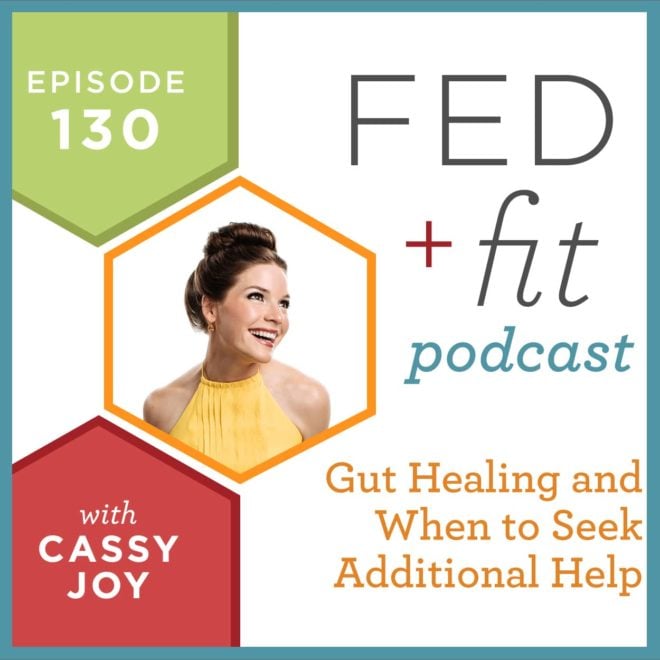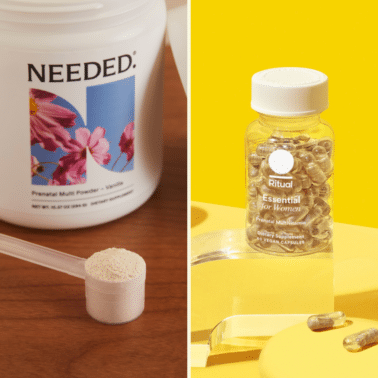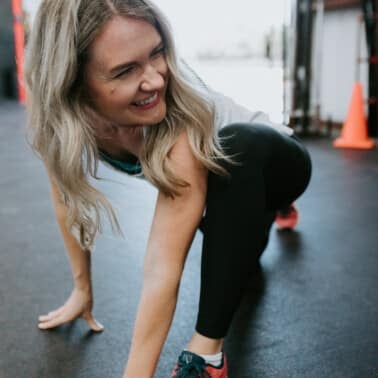On today’s episode, reverse interviewer Amanda shares her journey with gut health, asking for advice on a healing approach.
We’re back with our 130th episode of the Fed+Fit Podcast! Remember to check back every Monday for a new episode and be sure to subscribe on iTunes!
Find us HERE on iTunes and be sure to “subscribe.”
[powerpress]
Episode130 Sponsors
Episode 130 Transcription
Today’s show is brought to you by Pride of Bristol Bay, where you can get truly sustainable, high quality, nutritious Alaskan sockeye salmon delivered right to your door. Pride of Bristol Bay’s wild salmon is sustainably harvested in the pristine waters of Bristol Bay, Alaska. Their focused team of fisherman are committed to the highest quality in handling standards at the point of harvest, creating the unsurpassed quality and flavor you’ll find in every one of their wild sockeye filets and portions.
Each case of their wild salmon is labeled with the name of the Bristol Bay fishing district in which the salmon was harvested. It’s the ultimate in traceability. Boxes of supremely fresh frozen filets and portions of the highest quality salmon are delivered to your door, skin on, and already deboned. It is hands down the best salmon I’ve ever enjoyed.
You can learn more about Pride of Bristol Bay and support their important work by ordering your first box of frozen salmon by visiting their website over at www.PrideOfBristolBay.com. And, for the month of October, make sure you submit the discount code, “fedandfit”, one word all lowercase at checkout.
Cassy Joy: Welcome back to another episode of the Fed and Fit podcast. My name is Cassy Joy Garcia. I am your host. This is a weekly, 30-minute mindset, health, food, all those good things show. And I’m really excited today to bring you another reverse interview. And a reverse interview is where I invite a Fed and Fit listener or reader to come onto the show to ask some questions that maybe they wrote in to ask them directly over a conversation, so we can have a nice chat. Hopefully other folks can benefit from the conversation.
So today I am welcoming Amanda to the show. She lives in Jacksonville, Florida. She works at an ad agency, and she has two small kids. Welcome to the show, Amanda!
Amanda: Thanks, Cassy! Really, really excited.
Cassy Joy: Oh, I’m happy to have you here. This is going to be so fun. Feel free to tell folks a little bit more about yourself, and maybe a little background information before we lead into your question. And then really, the show is yours!
Amanda: Ok, awesome. So like Cassy said, my name is Amanda. And I live in Jacksonville. My husband is in the military, so we move around kind of a lot. I have two small kids. I also work at an advertising agency, so I am definitely busy, busy, busy all the time. Always running around after my little ones.
So I emailed Cassy originally because I have; first of all I have celiac. So I found that out about probably 6 or 7 years ago now. So I’ve always had stomach issues from starting in middle school, probably. And no doctor ever took the time to really figure out what was wrong with me until I got a new doctor. That doctor referred me to a GI doctor, which is the person that found out that I had celiac.
So I stopped eating gluten, and my stomach issues, essentially went away. But now, I’m having this issue where now sometimes when I eat I get like an empty burning sensation in the pit of my stomach. And I know that I haven’t eaten any gluten leading up, because I will have made all of my food leading up to that. So I know that it’s not gluten that’s hurting me. And my stomach gets kind of bubbly and I just don’t know if maybe my stomach needs some healing or what the issue is.
And also, I wanted to ask you Cassy, too, about maybe three steps or healing your gut for dummies, maybe you could go over that super quickly. Because I feel like, my first instinct is maybe my gut just needs some healing. And I don’t really know where to start with that. Because there’s so much information out there; I don’t even know. I don’t know where to start or what to do. So I welcome all of your suggestions.
Cassy Joy: Oh my goodness. This is good. This is a really good topic. Have you tried anything so far, aside from obviously avoiding gluten for the last several years?
Amanda: No. I tried a Whole30 at one point; but, I mean I did it for like a week and a half and I was over it. {laughs}
Cassy Joy: {laughing} Ok. That sounds good. So, what makes up the majority of your diet now?
Amanda: Let’s see; I eat mostly paleo; with dairy. I do eat dairy occasionally. And then sometimes I have gluten free breads and pastas, but that’s like maybe once a week I eat those things.
Cassy Joy: Ok. Awesome. That sounds good. And let’s see; what about alcohol, caffeine, things like that?
Amanda: Yeah, so I drink coffee. Like I said, I have two small kids. I sort of need it to survive. And then I also drink red wine.
Cassy Joy: Ok, perfect. So this is such a good question. Goodness. It sounds like you’re doing a great job. It sounds like we essentially have the same diet. {laughs} You eat dairy. Before pregnancy I was drinking red wine and a couple of other spirits. How would you say stress levels are? Sleep schedule, hydration.
Amanda: I definitely drink a lot of water. I don’t know, I couldn’t tell you how many ounces of water. But I definitely drink a lot of water throughout the day. I feel like ever since I got pregnant with my first daughter, I’m just permanently thirsty, so I chug water all day. Especially nursing; you definitely need more water. So I try to get in a lot of water. So I definitely drink a lot of water.
I get probably 7 hours of sleep a night, although those are never uninterrupted 7 hours of sleep. I go to be d around 10 and I wake up around 5 usually. I feel like I sleep pretty well. I don’t wake up feeling refreshed really, but I feel like I have been sleeping the whole time.
And stress level, I would say, is I don’t know. I work full time and I have two kids, so I do have a lot of stress, but I wouldn’t say that I’m miserably stressed by any means.
Cassy Joy: Yeah, got it. It’s just a busy season.
Amanda: Yes. Yes.
Cassy Joy: Yeah. I get that. Ok, this is so helpful. Can you describe a little bit the burning feeling you get in your stomach a little bit more? So have you noticed it with any particular foods? Is it right away? Does it set on after an hour?
Amanda: it is right away. And I haven’t noticed it with any specific foods. I have not narrowed it down to what, because I feel like it’s a lot of things. When I had emailed you; what prompted me to email you was because I had eaten an Epic Bar, and I think a banana. And I was sitting there like, wow. There’s a burning sensation, and it almost feels empty, like I’m still hungry. But I had just eaten, I shouldn’t be starving. And I wasn’t starving when I ate the snack. So I don’t know, it was strange. And it’s kind of like in the pit of my stomach. It kind of comes up a little bit into my esophagus a little bit, but it’s mostly in my stomach, and it just is there for a couple of hours after I eat.
Cassy Joy: Ok. So fascinating. Well, I mean this could really be a bunch of different things. It’s possible that it is essentially what you’ve pinpointed as, I have a damaged gut and I need to focus on healing my gut. I think that’s definitely a really good direction to think holistically.
You and I know this, but just saying it for all the listeners dialing in right now; normally when I would work as a nutrition consultant. I’m not a medical professional, but when I would work with patients, I would probably have asked you to keep like a 2-week long food journal so we can study and look at your symptoms. See exactly what you’re eating, exactly what the triggers are, and exactly how you’re feeling after foods. And then from there, suggest; make holistic lifestyle type suggestions. Maybe try to eat a little more of this, a little less of this. That kind of stuff.
So this is really interesting. It could be a number of things. It could be that there is some acid reflux going on. Maybe some sort of a reflux is happening, because it can be happening in various different parts of our intestines, right. It’s not necessarily just heartburn. We can feel it in other areas. So that could be a piece of what’s going on. It’s really hard to pinpoint it.
I’m going to give you what I would want you to do if you were a girlfriend calling me, and asking me for advice, and then we’ll talk about some holistic overall possibilities. But I would say reach out to a naturopath. Or if you haven’t already, talk to your doctor about it and see if you can get maybe some testing done to see exactly what’s going on. There could be some sort of an ulcer. There could be some sort of a reflux at some point along the system that’s happening. And it could be aggravated further by certain foods. And so maybe some sort of a food sensitivity panel.
I’m not actually an advocate for biohacking, because I think it spins us down kind of an obsessive rabbit hole of trying to restrict, restrict, restrict. But for a short period of time, it sounds like you have a really good head on your shoulders in wanting to have lots of good foods and just heal holistically, right?
Amanda: Yes.
Cassy Joy: So, I would say that a food sensitivity panel, which you can get when you work with a naturopath. There are some general physicians out there who may be more open minded. But somebody like that; if you don’t already have one, do some searching in your area. See if you can get a food sensitivity panel, and also see if they can find something actually going on in your stomach and in that area to see if there is some sort of an ulcer or some reflux. Some damage that’s going on; GERD, that kind of deal. So I would rule some of those bigger guys out first. Right?
And from there, you’re right. It is about gut health. Ultimately, that’s what we’re working towards. So what are some of the things that we can do more benign, holistic, the advice a nutritionist can give you approach outside of that. I would say it’s not necessarily that we would need to restrict so extremely for 30 days, and then retest. I’m not really a believer in that. Because some conditions take a little bit longer to heal from depending on what it is. And that’s why knowledge is power in this case. The more you know about what really is going on there, the better equipped you are to develop a plan and tackle it.
But I would say, in a very general sense, the foods that are probably going to aggravate you the most are probably going to be those high-grain foods. Right? So even the gluten free pastas, those kinds of things. Now, if it’s make or break. If it’s; I need to either have a gluten free pasta night at my house or I’m going to ham on some delivery pizza. You know? I would rather you have the pasta once a week versus throwing the baby out with the bathwater on the other side. You know yourself best there. But I would say try to avoid those. Or be mindful of them and know that that’s probably not helping the condition as much; the grains in any form.
See if you can’t swap out the dairy for non-dairy alternatives. For a time period, right? Again, I eat dairy. I eat gluten free grains. So I think that is definitely the direction to eventually go. But to give your body some time to heal, this may be a good period to do that. And I would be weary of non-dairy alternatives that have a bunch of other junk in them.
It’s probably obvious to you, and a bunch of other listeners, but just in case there are new folks here, some things to look out for is; let’s say you go to the store and you’re wanting to buy almond milk. Or coconut milk. Just like any other pre-prepared food, prepackaged food, you want to get the ones that have the fewest number of ingredients, the most intelligible ingredients. Because there’s a lot of stuff they can slip in that’s worse for you than if you maybe had just had milk. Right?
So I would be cautious of those. Try to go for as few ingredient dairy alternatives as possible. Coconut milk, nut milks depending on how well you do with other nuts. Coconut usually bothers folks a little bit less than other nut milks out there. I would start there.
I would limit; I don’t know how often you’re having red wine or whatever it is. But I would try to limit it to, start off to maybe once a week. And if you feel like that’s a no-biggie, and you could easily go even further than that, then maybe try to cut it out altogether. And see what happens. Because alcohol; no matter what form it comes in. Whether it’s wine, a shot of tequila, a gluten free beer, whatever it is. It wrecks our guts.
And for people who have perfectly healthy guts and they’re not having any issues, we can destroy it and then our body repairs it. Right? We’re constantly healing. We’re constantly going through that cycle. Our bodies are made to heal, that’s what we do. Sometimes we just need to give it a little bit of a leg up. So I would suggest cutting that out, as much as you feel good with.
The most important thing here is to not go down, like I said, that obsessive mindset rabbit hole. So if cutting out red wine and the pasta and swapping out the dairy all at once is going to make you feel like you don’t feel like yourself anymore, then make some decisions there and some allowances for yourself. There’s really no one right way to go.
And then from there, I would not worry. You asked in your email, also, about reintroductions of healthy gut bacteria. I would not worry about it right now. The kind of sequence, when it comes to healing the gut. Gut health 101, like you asked. Really, we want to remove the aggravators, we want to let the body repair itself. We want to let the body heal; let it do what it does best. And then we want to reinoculate. So that would be; we know that we’re ready for that last stage when you are able to eat something without feeling pain.
But any time you do have some sort of a physical pain, I do recommend going and seeing your physician, just to see what’s going on. Because it could be a bunch of stuff. It could be something really benign that’s going to be really easy to fix. Or it could be symptomatic of maybe a food allergy you had no idea was lurking there. But I think that some diagnostics run with your favorite physician set up next to a food sensitivity panel will probably tell you a lot.
Now, know; keep this in mind too. We’ve talked about this a little bit on the show. When you have a damaged gut. And you, I don’t just mean you, but the world at large. When we have a damaged gut, we tend to react to more foods than we would if we had a healthy gut. Right? So your food sensitivity panel is going to come back probably showing a reaction to a bunch of stuff. And you’re going to think; oh my gosh. I can only eat salmon and broccoli. Or whatever it is, you know?
I just want you to know going into it. Remember that they’re going to be high; but that’s really a sign that you do have some sort of intestinal permeability going on. And when we heal the gut, and let’s say you go back and taste that test a year from now after really going through some really focused efforts, you’re probably not going to be as sensitive to a lot of those foods. So it’s not a forever kind of sentence. It’s not, “I can never eat chicken again in my life!” I don’t want you to think that. But it could be that you eat a lot of it, and your body is just inflamed in general, and hypersensitive, so it’s going to build some antibodies to chicken.
Is that helpful?
Amanda: Yeah, yeah. Absolutely.
Cassy Joy: So we want to remove the aggravators, so that could be the grains, it could be the dairy, it could be the alcohol. That pretty much is it. It sounds like you’re probably also avoiding some of the other ones. I would try to stay away from soy as much as possible. You’re probably already doing that. I would stay away from those. I would stay away from foods that you know bother you, or you suspect might bother you. Like if you know avocadoes sometimes tend to bother you. Or coconut may actually bother you.
It’s possible that you also have a FODMAP sensitivity. A lot of folks that suffer from irritable bowel are also sensitive to FODMAPs. And those are these essentially short little carbohydrates found in certain foods. They’re found in avocado, coconut, garlic, onion. Those kinds of things.
And again, that’s not a forever sentence, so don’t think that it is. But I would start paying attention to those foods; compare that with a food sensitivity panel test. Try to avoid the ones that are the biggest aggravators for a period of time. That could be 30 days; that could be 90 days. Until you really start to feel better. And start working with your naturopath, again. Somebody you trust to help you build a regimen to reinoculate.
And they may even recommend you start that right away. And there’s nothing wrong with that. But in terms of thinking about priorities, I would rather you mentally prioritize, removing the aggravators, and then resting, and then reinoculating.
Amanda: Ok.
Cassy Joy: Ok?
Amanda: Alright.
Cassy Joy: Does that sound good? Is that helpful?
Amanda: Yeah, that’s super helpful. I thought for a while that maybe I should go back to doing something closer to a Whole30 where I just eliminated all of it. So maybe this is my time. {laughs}
Cassy Joy: Yeah. It could be. And there’s no need to be too legalistic with it. I really don’t want you to think that. With a lot of the really, really restrictive programs out there, that tends to be the direction. So I would just think of it as your own personal brand of a healing protocol.
Amanda: Ok. I like that.
Cassy Joy: Yeah. And maybe that includes once a week you have a glass of wine, you know, with your Sunday dinner or whatever it is. You know? Whatever you think. This is part of my personal protocol; and it might mean I’m going to heal a little bit slower than I would have if I had just ripped everything out entirely, but I’m good with that.
Amanda: Ok.
Cassy Joy: So there is a way to have your cake and eat it too; it’s just going to take you a little longer to eat the cake. {laughs}
Amanda: Ok. {laughs} I like that. I definitely like that approach, and I appreciate it. I don’t know that the all or nothing thing is really good for me.
Cassy Joy: Yeah. And you know what, it isn’t for most people. You’re not alone there. It’s a shiny toy, you know, and we think; oohh! I’ll go all in, and I’ll get all this. I’ll get all these benefits lickity split! But at the end of the day, we don’t think about what that does to our mindset around food. Right? Because then we start to look at food as either good or bad, you know. And that takes so long to heal from. And that’s just not a really good healthy relationship.
Amanda: I agree.
Cassy Joy: I think you’re on a great track. I would definitely priority one, reach out to a naturopath. Get some tests done. See how you feel. The naturopath can help you with the allergy panels. Your other doctors can help you with the other tests, diagnostic tests, just to again, see what’s going on.
Amanda: Ok.
Cassy Joy: Does that sound good?
Amanda: Awesome. Will do. Yes. And then I’ll check back in with you and let you know how I’m doing. {laughs}
Cassy Joy: Good, I’m excited. I’m excited hear back from you. Well, thank you so much for coming on the show today. It’s been a great conversation, and I know you’re not alone out there so I’m sure that it’s helped other folks. And for everybody else who dialed in, thanks so much for dialing in. As always, you can find a complete transcript of today’s show over at www.FedandFit.com. And as always, we’ll be back again next week.













Hi Cassie! I listened to the podcast, and you mentioned a naturopathic approach. I live in Iowa, and sometimes these things aren’t as advertised. Is there a website or an organization that I can use to find someone to work with? Any advice or direction would be appreciated!